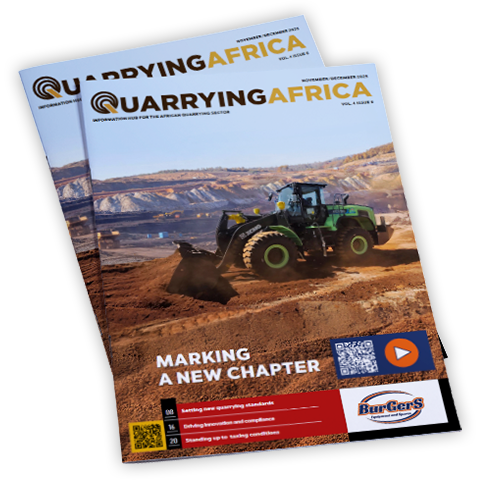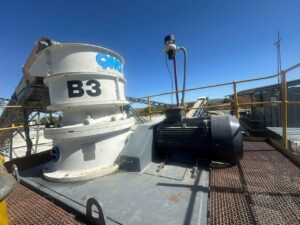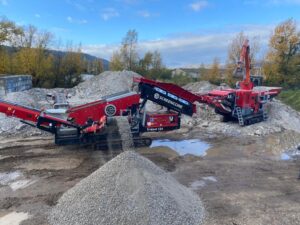Technical skills are in high demand in the quarrying industry as companies seek to maintain their competitive advantage and develop a track record of success through innovation. Given the dynamics, Glenn Johnson, GM Construction Materials at AfriSam, stresses that it is vital for companies to commit to the development of their people.
“I am a firm believer that our industry needs strong technical skills at the core of our operational excellence – that is fundamental,” Johnson emphasises.
AfriSam’s ongoing commitment to skills development hinges on two main elements. Firstly, the company understands that it has a duty to the country to develop people. Johnson believes that there is a strong correlation between a skilled society and a country’s sustainable economic growth, and the absence of the former inhibits the possibilities of the latter.
“The second element, and probably the most important one, is that as a business we ought to have better traction with the people that we develop ourselves,” he says. “By investing in our own talent pool, we are, from the onset, able to better equip our people to deal with the nuances of the organisation.”
Johnson stresses that discipline and standards are critical in the mining environment, and these are key focal points in AfriSam’s people development processes. Those who come through AfriSam’s skills development programmes have demonstrated a strong understanding of what it means to be part of the company – the value system, performance criteria and expectations of operational excellence. This helps employees to perform their roles more effectively and efficiently, leading to improved job performance and ultimately the success of the organisation.

Training programmes
As part of its skills development portfolio, AfriSam offers several internal training programmes for its aggregates business. These include Trainee Works Manager programmes, Engineer-In-Training, Artisan Learnerships and general operational training. This has recently been expanded with the introduction of the Trainee Operational Managers programme for the readymix business unit.
The Engineer-In-Training is a structured training programme for young graduates who have come through AfriSam’s bursary pipeline. Selected individuals – those who have shown the best aptitude for the aggregates and readymix businesses – are integrated into the programme. The programme seeks to develop a strong pipeline of electrical, mechanical, civil and mining engineers.
“Engineers in training have to undergo a structured training programme with the aim of, first of all, getting them to attain their professional status. I am of the firm opinion that one only becomes an engineer once one has been registered as a professional engineer. We therefore encourage our young engineering graduates to formalise their education by acquiring their professional status. This opens new doors for them as they can be professionally recognised in their chosen engineering discipline,” he says.
Very often, notes Johnson, candidates who go through a trainee programme of this nature get lost along the way because they do not feel significant. Fundamentally, AfriSam affords its engineers in training a sense of significance by assigning them to drive projects that have a significant impact on a quarry operation or the AfriSam business at large.
“At the end of the day, it fulfils two purposes – it makes trainees feel significant because they have contributed to a meaningful cause, but more importantly it gives them the correct exposure in their journey to become professional engineers,” explains Johnson.
As part of their development, trainees are afforded the opportunity to tap into a network of engineers within the AfriSam environment and also contacts that the company has made externally, for example, providers of engineering solutions to AfriSam.

Development path
AfriSam has a two-pronged approach to further developing its Engineer-In-Training graduates. They are either afforded the opportunity to move into line management or to stay in their chosen technical discipline, be it mechanical or electrical engineering, or a multifunction of the two disciplines.
“Candidates for our Trainee Works Manager and Trainee Operational Manager structured programmes are chosen from our Engineer-In-Training pool. They can further their career by going into works management at our aggregates operations or become operational managers on our readymix plants. It generally takes up two years for candidates to complete these programmes,” says Johnson.
The Trainee Works Manager programme exposes candidates to all the critical aspects of works management on aggregate operations, including legal training, blasting certificates, financial management and, more importantly, people management, amongst others.
The Trainee Operations Manager programme follows pretty much the same pattern, but with a specific focus on readymix concrete production, including technical specifications, product application and customer interface, amongst others. Candidates are also exposed to the financial and operational aspects of the readymix business.

Artisan Learnership
For AfriSam’s Artisan Learnership Programme, prospective candidates are generally people who have completed their National Qualification Framework (NQF) courses, be it internal employees (18.1 learners) or external candidates (18.2 learners).
According to Johnson, AfriSam plays an active role in the development of artisans because the company believes it is an important skills-set that has been lost in the country. A functional economy, he says, must have a sufficient number of artisans if it is to fulfil its potential. The same goes for a technical industry such as quarrying – artisans are the lifeblood of a functional industry and “are the tool that keeps operations going”, says Johnson.
“In my view, it is a bit challenging to train artisans at the moment, largely because the quality of trade schools has deteriorated alarmingly compared to the years gone by. The quality of artisans today is not what it used to be decades ago when we still had functional trade schools. We need that same passion back in the country and therefore encourage young people to be tradesmen,” he says.
With that said, AfriSam has recorded massive success with its Artisan Learnership programme over the years. Several young people have qualified through this programme. To provide context, out of the 113 development positions since 2012, a total of 83 artisans – both 18.1 and 18.2 learners – came through the system.

Key successes
Over the years, AfriSam has also achieved enormous success with its Engineer-in-Training and Trainee Works Manager programmes. For example, of the 113 development positions created since 2012, 30 were engineers in training and internships.
Flagship milestones attained over the years are also testimony to the success of these development programmes. For example, Isaac Mabalane, who now works for a different organisation, was the first black certified (GCC) engineer to come through AfriSam’s engineering graduate programme. Gao Sebego, the first black female works manager at AfriSam, is also a product of the Trainee Works Manager programme.
Several other works managers have also come through the programme. For example, every single works manager at all AfriSam aggregates operations in Gauteng has come through the company’s training programme. Some of the names that come to mind include Louis Sterley (Rooikraal and Sub Nigel), Mohammed Docrat (Jukskei), Chris Yedwa Mgxekwa (Eikenhof) and Moses Nkuna (Ferro). In KwaZulu-Natal, Ernest Sebeelo (Petermaritzburg Quarry) and Llyod Maringa (Coedmore Quarry) are also products of AfriSam’s various development programmes.
High up the ladder, several line managers in the business have also gone through the training programmes. For example, Zielas du Preez, regional manager, Construction Materials Gauteng and Cape Operations, and Theolan Govender, former engineering manager and now regional manager, Construction Materials KZN, are products of the company’s training programme. Other high-profile executives who have their roots firmly rooted in these development programmes include Avi Bhoora, construction materials executive at AfriSam, and Glenn Johnson, General Manager Construction Materials.
AfriSam’s investment in skills development has not only paid dividends for the company, but the industry at large. A case in point is the large number of ex-AfriSam employees in high-profile positions at competitor organisations and industry bodies. Letisha van den Berg, the now director of industry association, ASPASA, is one of the flagship names that springs to mind. Having started out her stellar 17-year AfriSam career as an admin clerk at the AfriSam Newcastle quarry in KwaZulu Natal, she rose through the ranks to become Construction Materials Health and Safety Manager in 2015.
“Despite the recent challenges brought about by the Covid-19 pandemic and the continued downturn in the construction sector, which have put pressure on our development programmes, we continue to show the resolve to develop people. I also urge other industry players to play their part in developing skills the industry needs, now and well into the future,” concludes Johnson.






